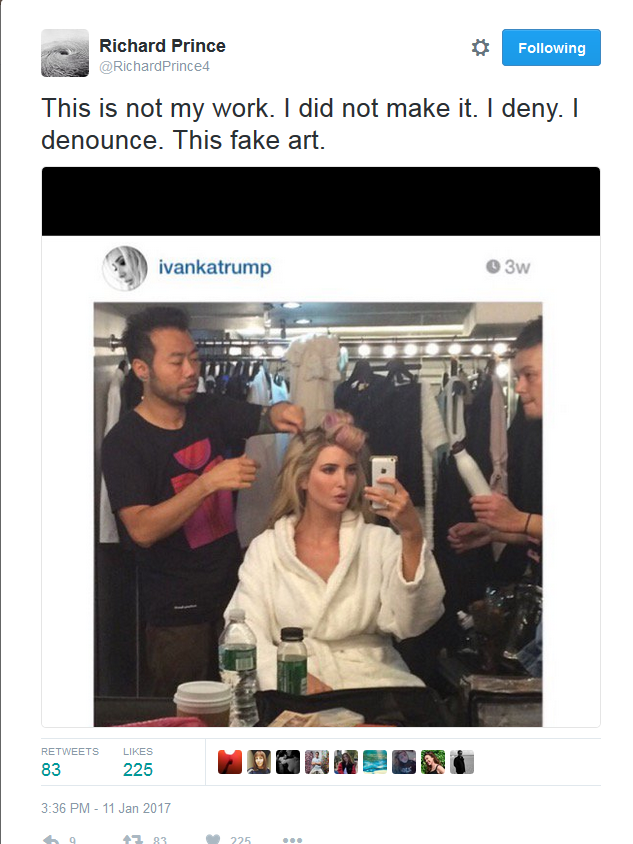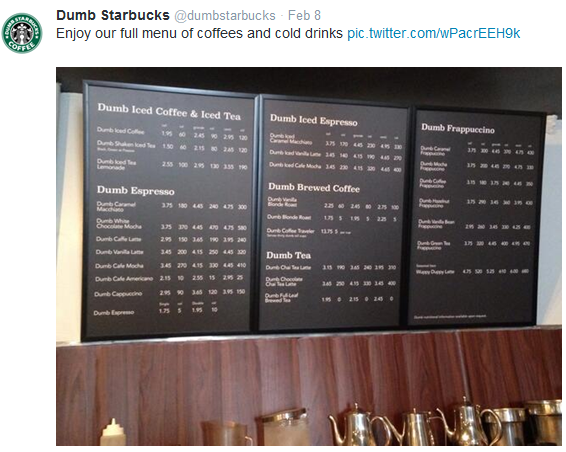There has been much discussion about the impact of the Presidential election on the art market, amidst much generalized anxiety about "fake news." What about "fake art?" Never one to be behind the curve, artist Richard Prince has stepped into the spotlight (to the extent he left). Declaring that one of his controversial “New Portraits” works of Instagram posts of others that was sold to Ivanka Trump is “fake” and that he “denounce[s]” it, Prince raises interesting questions about what the legal ramifications of such a repudiation might be. In this instance he has apparently refunded Ms. Trump’s money, but following on last year’s surprising Peter Doig trial (surprising that it got to trial, not that Mr. Doig won), a hypothetical artist making such a declaration might have some vulnerability under both common law, if not under the Visual Artists Rights Act of 1990, 17 U.S.C. § 106A (VARA).
Fake News, Fake Art? Richard Prince Disavows Work Depicting Ivanka Trump
Topics: Richard Prince, Patrick Cariou, Visual Artists Rights Act of 1990, Art Market Monitor, VARA, Twitter, 17 U.S.C. 106A, Ivanka Trump
Fox News Seeks to Take Fair Use Questions Over 9/11 Photo to the Second Circuit
Fox News has petitioned the Second Circuit Court of Appeals to overturn an adverse ruling over use of the iconic photograph from September 11, 2001, known as “Raising the Flag at Ground Zero.” Rightly taking issue with the mostly unhelpful guidance left by Cariou v. Prince, Fox News and personality Jeanine Pirro (recently in the news for the interviews with her as part of HBO’s The Jinx about Robert Durst) have asked for the extraordinary step of appealing the denial of their motion for summary judgment. While that motion probably won’t succeed in the short term for reasons discussed below, the issue will likely end up in the Court of Appeals at some point. The application that the defendants suggest, however, seems like an exception that would swallow the rule.
Topics: HBO, Cariou v. Prince, 9/11, Raising the Flag at Ground Zero, The Jinx, Second Circuit, World Trade Center, September 11 2001, Robert Durst, Fox News, Jeanine Pirro, Justice with Judge Jeanine, Instagram, Copyright, Herald News, Twitter, The Record, Fair Use, Thomas E. Franklin
“Dumb Starbucks” Epilogue: Comedy Central Airs “Nathan For You” Episode Behind it All, Explores Parody, Commerce, and Visual Art
Readers will recall the strange case of “Dumb Starbucks” earlier this year, which initially seemed to pose the question of whether a coffee shop that transparently used the marks and copyrights of Starbucks could claim fair use as an art gallery. It turned out that the entire performance was just that, a lead up to a Comedy Central series that has since debuted. We are not, of course, television critics, but in addition to being hillarious (and undoubtedly tongue in cheek), the full episode is an interesting platform for questions about the players and entities that can claim fair use to copyrights or trademarks over visual and creative works. In the end, the parody/fair use question could never really be answered, but the coverage the numerous news clips that the show included is a reminder of the difficulty of applying art critical concepts to legal analysis.
Topics: Comedy Central, parody, Nathan for You, Weird Al Yankovic, @dumbstarbucks, Nathan Fielder, Copyright, Starbucks, Twitter, Fair Use
Is "Dumb Starbucks" an Art Gallery in the Eyes of the Law?
News that a coffee shop had opened in Los Angeles entitled "Dumb Starbucks" has again raised the proper interpretation of fair use under U.S. intellectual property law into the realm of popular culture and commerce. Whereas last year’s Beastie Boys/GoldieBlox dustup (still ongoing) revolved primarily around copyright law, here the potential issue is one of trademark infringement. To stave off accusations of liability, the new enterprise has preemptively labeled itself an "art gallery." Will this hold up? Even Starbucks seems puzzled.
Topics: 505 U.S. 763, parody, Landham Act, Weird Al Yankovic, @dumbstarbucks, Green Day, Bad Starbucks, 17 U.S.C. § 107, 15 U.S.C. § 1115(b)(4), GoldieBlox, Copyright, Dr. Evil, Starbucks, Number Two, Twitter, Two Pesos Inc. v. Taco Cabana Inc., Beastie Boys, Fair Use, Merriam-Webster, Austin Powers




